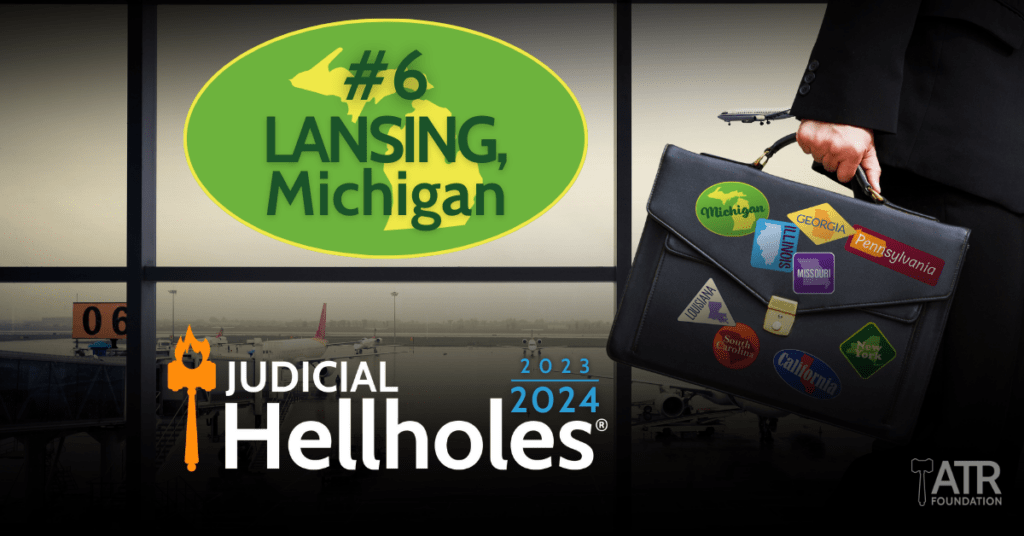‘Highly Unusual’ Rehearing of Louisiana Case Raises Judicial Independence Concerns
Louisiana Supreme Court Waffles Under Political Pressure, ATRA Brief Urges Court to Stand Strong

Judicial Hellholes® Report Highlights Asbestos Litigation Challenges
Making unfortunate history, Lansing, Michigan lands on the Judicial Hellholes® report for the first time this year, securing the No. 6 position.
Michigan’s debut on the annual report from the American Tort Reform Foundation reveals a complex web of challenges. The state supreme court’s recent expansions in premises and medical liability, coupled with pro-plaintiff legislative changes, are poised to increase costs and uncertainty in the state’s civil justice system, per the annual ATRF report.
“Michigan’s Supreme Court took an activist role this year, taking overt steps to overturn long-standing precedent and expand liability in numerous areas of law,” Tiger Joyce, president of the American Tort Reform Association said.
This designation highlights critical challenges that residents and businesses alike face in the state’s civil justice system. The Michigan Supreme Court’s decision to overturn a longstanding framework for slip-and-fall cases expands premises liability law and is expected to generate a wave of slip-and-fall cases in Michigan according to ATRF.
“Michigan’s rejection of the open-and-obvious doctrine, once a reasonable defense for property owners, will now expose them to unprecedented liability and put small businesses in the crosshairs,” Joyce said. “This not only affects business owners but also has significant implications for anyone who owns property in Michigan, leaving them open to a lawsuit if someone is injured on their property – even when the risk was evident.”
Michigan’s Supreme Court also overturned a decades-old precedent related to medical liability this year, specifically regarding the affidavit of merit. This affidavit, signed by a medical expert, is crucial to validate a plaintiff’s claim against a healthcare provider, but no longer needs to be filed within the statute of limitations. The earlier requirement for an affidavit of merit at the inception of a lawsuit served to deter frivolous claims.
“By overruling this requirement, Michigan can expect a surge in medical liability cases lacking the necessary merit, increasing the burden on the legal system and medical practitioners,” Joyce said. “An increase in medical liability lawsuit abuses can drive doctors out of the state due to increased costs, impacting availability and access to high-quality healthcare for families.”
Two other cases before the state Supreme Court, Danhoff v. Fahim and Estate of Horn v. Swofford, may impact standards around expert testimony in medical liability cases.
“The Court’s ruling in these two cases will shape the future of medical liability cases in Michigan,” Joyce said. “Overturning long-standing precedent or allowing experts with questionable foundations to testify can open the door to junk science in the courts, putting not only the fairness and integrity of medical liability cases, but both patients and providers at risk as well.”
Beyond the state Supreme Court’s expansion of liability this year, ATRF says lawmakers also are to blame for Lansing’s new-found Judicial Hellholes® designation. The Foundation points to a significant shift in Michigan’s political landscape following the 2022 election. They say the result is a legislature that’s more friendly to the trial bar’s propositions and lawmakers who pursue liability-expanding legislation.
One bill Democratic Gov. Gretchen Whitmer is expected to sign will undo existing liability protections for drug and device manufacturers. S.B. 410 repeals a 23-year-old liability protection that aligned state law with FDA determinations on drug safety.
“Senate Bill 410, if signed into law, will have significant implications for healthcare and patient safety while simultaneously exposing manufacturers to more lawsuits,” Joyce said.
State lawmakers also considered other liability expansions this year, which will be reconsidered in 2024. S.B. 329 proposed a “bad-faith” cause of action against insurers, allowing for emotional distress, punitive damages, and attorney’s fees. Another bill, H.B. 5201, seeks to expand the state’s consumer protection laws, which ATRF warns could expose of businesses and professionals to costly litigation.
Michiganders pay an annual “tort tax” of more than $900, contributing to nearly 90,000 job losses each year due to excessive tort costs. ATRF says this year’s legal developments, particularly in premises and medical liability, likely will exacerbate these costs in the future.
“As Lansing takes its first steps onto the unwelcome stage as a Judicial Hellhole®, it should be a wakeup call,” Joyce said. “The Legislature must push back on the trial bar’s relentless agenda and embrace reforms that protect small businesses, ensure transparency, and restore faith in the legal system.”
For a comprehensive analysis of this year’s challenges and to read the full section on Lansing, Michigan in this year’s report, visit JudicialHellholes.org.
Louisiana Supreme Court Waffles Under Political Pressure, ATRA Brief Urges Court to Stand Strong
Left unchecked, these jurisdictions will continue dragging down economic growth and undermining justice through rampant lawsuit abuse.
Claimants Given Opportunity to Vote on Plan; Judge to Reconsider Scientific Validity of Plaintiffs’ Experts
Legitimate consumer protection demands sound science and impartial analysis — not distorted data designed to manufacture lawsuits.
Law Firms Spent $168M+ on 2.2M Ads in Georgia
ATRA’s Latest Studies Reveal Financial Influence and Lack of Transparency in Pennsylvania’s Campaign Finance Systems